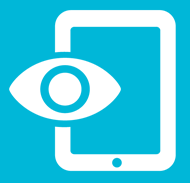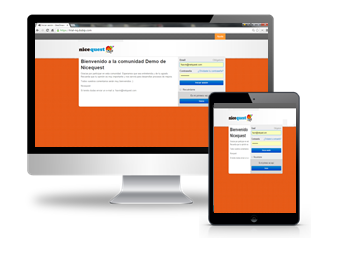Today we want to present you a new technology that will probably revolutionize the market research industry within the next years. It is called the Netquest Tracker, a key technology to carry out a new market research investigation: the behavioral research.
Tracker is a software developed in collaboration with Wakoopa that once downloaded and installed on a PC, Smartphone or Tablet of an individual is able to record his digital fingerprint, that is, his online behavior. This technology makes it possible to obtain large volumes of data in real time about what people do on the internet: which websites do they visit, their search-terms, which advertising do they see and when, etc. And all this without having to ask them directly, just by simply observing and recording their online actions.
This data collection method is more objective, since it avoids the biases inevitably associated with traditional surveys, in which the individual himself must self-report his habits.
Why is this new research revolutionary?

Most products and services available on the market can be defined, quantified, classified and segmented more or less directly. For example, in the market there are branded concentrated softeners with blue fragrances; at a higher level, we would find the market of concentrated softeners; then there would be all generic softeners, and if we keep generalizing, the market of cleaning products.
But when we put the focus on consumers, segmentation gets more complex. Each consumer is different and acts uniquely, according to many variables, such as his preferences, hobbies, place of residence, preferred brands, level of income, etc. In this sense, it is possible that very different people purchase the same product, or not. In fact, this particularity makes segmenting consumers and finding market niches something complex but really necessary to optimize marketing strategies, seek new businesses or encourage creativity.
The usual approximation to solve this problem is to classify consumers according to their socio-demographic profiles (gender, age, social class…) but this is just a simplification of the segmentation problem. Fortunately, observational research gives us a broader look and opens up new market research possibilities with an enormous potential. An era in which consumer is at the central position and that provides a much deeper knowledge about his habits, because the collected data is based on what he does, not what he claims to do.
Declarative research, or what is the same, understanding and investigating the consumers based on what they claim to be or to do, and especially what they think, will keep being necessary.. However, in the future will no longer be enough, and neither will it be to know when and what they have purchased, we will also need to add their behavior to these analyses.
Today we are able to get this behavioral data and to try to understand why the actions are taken. What is more, analyze the online behavior through observation gives us an invaluable consumer dimension. Each consumer is different and acts uniquely, with his own experiences and background, and that makes it difficult to find two identical consumers. The work of segmenting consumers through their behaviors is essential to establish a new type of research.
New problems to investigate, new methods
 Combining online behavioral data with self-reported information through questionnaires allow the researchers to understand how the consumers take decisions, optimize their online purchasing processes and campaigns, identify which are the most successful webs/apps, detect new trends, define consumers’ profiles (influencers, communicators, relationals, functionals, etc) and define target audiences, among other uses. Moreover, short-term prospects are huge: thanks to the possibility of capturing online behaviors, we will be able to investigate new consumer’s dimensions and develop more accurate predictive algorithms.
Combining online behavioral data with self-reported information through questionnaires allow the researchers to understand how the consumers take decisions, optimize their online purchasing processes and campaigns, identify which are the most successful webs/apps, detect new trends, define consumers’ profiles (influencers, communicators, relationals, functionals, etc) and define target audiences, among other uses. Moreover, short-term prospects are huge: thanks to the possibility of capturing online behaviors, we will be able to investigate new consumer’s dimensions and develop more accurate predictive algorithms.
Let’s see an example: imagine that we observe a consumer and, by tracking his navigation, we detect that he is visiting travel websites. The probability that he ends up hiring a trip in the following months is substantially bigger. That is to say, if we add and manage information more properly we could anticipate the selling or the hotel occupancy for a certain country or population at a specific moment of time.
Such a simple example as this one gives us an idea of the great possibilities that the behavioral data collection may provide to market research.
Observational research challenges

This new data collection model not only brings opportunities, it also entails big challenges. To guarantee the future of behavioral research we need to combine technological advances with the strictest respect to the privacy rights of the people who share sensitive information through their internet navigation.
Netquest face this new era with an unwavering commitment to the protection of the panel participants’ information, by analyzing their data excluding their identity and using it strictly for market research purposes. And, of course, we are determined to treat them fairly and in return for some type of compensation. In the following post we will be going into this issue in depth.
The main challenge of behavioral research for the upcoming years is, with no doubt, the creation of big panels that are able to retain their participants. Most of these challenges involve identifying rare profiles, which requires bigger panels, and observing them for a long period of time (for some months or even years).
In Netquest we are confident enough to offer effective solutions to behavioral data collection based on the strength of our panels. The trust-relationship built with our participants, our local knowledge and our commitment with technological development are the 3 pillars that have contributed to create the first observational panel of Latin America, Spain and Portugal with an unique and advanced data collection system –the Tracker- that will definitely change the market research industry.
Our new observational panel is already working, growing up every day and collecting online data for your research.
Join Netquest’s observational research!





